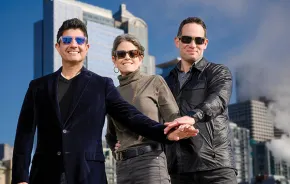In 2001-02, I had the privilege of working with Shelby Tarutis and the
non-profit organization GambiaHELP. This Seattle-based organization,
which Tarutis founded in 1998, is an outgrowth of her time as a Peace
Corps Volunteer in the West African country of Gambia.
Its efforts include those projects that are educational, environmental,
entrepreneurial and health-related. GambiaHELP often centers its
initiatives on women and children, in part because they don't have the
same access to resources as men do.
Tarutis' success in helping Gambians help themselves is outlined on her Web site, www.gambiahelp.org. As a result of her efforts, ParentMap is recognizing Tarutis as this month's hero.
Q. Tell me about GambiaHELP's first undertaking: the Books and Libraries Project.
A.
Before we started this project, most rural schools did not have any
books. I remember one school where the "library" was a bookshelf behind
the principal's desk, which no one could touch. Students could only
copy what was on the board and then memorize it. Today, there are
approximately 50 school libraries where children can take books home,
practice reading, and look at the pictures. With help they're able to
grasp the stories, and begin developing critical thinking skills and
ideas outside of themselves. We have distributed around 100,000 books
to Gambian schools now. When I started GambiaHELP, there was less than
one book for every 15 kids in Gambia. Now they probably have one book
for every five.
Q. You'd think that donating books would be a fairly simple task, but it isn't?
A.
You don't want to just drop off books at a school and not know what
happens to them. Following the donation until it gets into the hands of
the kids is key. To be a responsible donor, you need someone there to
help process the books, and to introduce them to a school. Sometimes
kids will have only seen a book in an elder's hands, so it's
introducing a whole new concept to them. They need to know how to take
care of books, how to value them. The students need to wash their hands
before they use a book, for example. It's an education process.
Q. Which project are you most proud of?
A.
The milling machine, owned by a women's group in a small rural village
with no running water or electricity. It takes the hulls off the rice
so the women don't have to do so much pounding. For every 10 cups of
rice milled, the women get one cup profit. They slowly make bags of
hulled rice with their profits, which they can either sell or add to
their cereal bank. They can also exchange rice for groundnuts [peanuts]
or coose [another grain]. So then the bank will have a variety of
foods, which they can withdraw from during the lean times. Since you
must also have the education along with the project, we're teaching
them accounting, and how to manage the business. And it's working.
Q.
With the current economic and political climate in Gambia, do you worry
about people leaving, taking with them the resources you've invested in
them?
A.
There's a huge brain drain in Gambia. People want to leave the country,
to make money overseas and send it home. You can't blame them for
wanting that opportunity. If I make an investment in someone and they
leave later, I know the investment has been dispersed. If we give new
ideas about development to someone or somebody, it will be transmitted
to other people. But you also have to give people hope that things will
get better. How do you do that? By coming back every year, by being
optimistic, by encouraging them to take advantage of opportunities. The
problem is that they don't have a lot of "how to" information. I try to
teach them the "how to." They might have an idea, but how do you get to
the goal? That's where the critical thinking skills become important --
you come to a roadblock, what do you do next?
Q. Like the well project?
A.
That's right. They wanted to build a well in one community where they
lost their clean drinking water after a flood. I went there, we wrote
up a contract, got supervisors and built it. They knew they wanted a
well, they just didn't know how to get the resources. Sometimes I teach
people how write project proposals, then they send them to me and I get
the funding. We're slowly getting there, taking baby steps.
Q. If you could communicate one thing about Gambia to Americans, what would it be?
A.
Just because the people are poor, it doesn't mean that they can't also
teach us. Family is very important, no one goes hungry, and the elderly
are respected and cared for. While Americans have much to offer, we can
also learn that family and community are among society's most valuable
commodities.
Laura Fine-Morrison is a Seattle freelance writer and mother.









